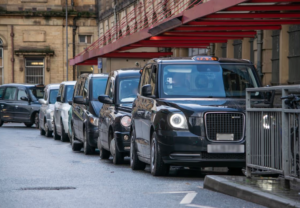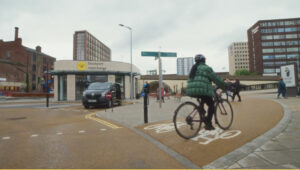The Greater Manchester Combined Authority will receive an update on the final Greater Manchester Clean Air Plan this week, which could be put forward for approval this summer.
The update, expected on Friday, according to a new report by Transport for Greater Manchester, will say that work is already under way to assess and understand public consultation responses and impacts of COVID-19 on Clean Air Zone proposals and funding support packages.
The ten GM local authorities are under direction from government to introduce a category C* charging Clean Air Zone – including commercial and passenger vehicles but not private vehicles – to secure compliance with nitrogen dioxide (NO2) standards on local roads in the shortest possible time, and by 2024 at the latest.
According to government, only the most polluting older vehicles are charged in a Clean Air Zone, and it is not a congestion charge.
During an eight-week-long public consultation between 8 October and 3 December 2020, 4,765 responses were received from businesses, organisations and the general public.
Feedback was given on key elements such as the proposed Clean Air Zone boundary, daily charges for affected vehicles, and how COVID-19 has affected businesses in Greater Manchester.
The consultation also sought feedback proposed £150m government funding support package to help local people and businesses upgrade to cleaner, compliant vehicles that do not incur a daily charge, before the Zone is introduced.
This will be essential to support impacted vehicle owners to upgrade, while facing the economic impact of the pandemic. It includes a Hardship Fund, for those most in need. Government has committed £41m so far to the programme.
At the same time, a consultation was held on the closely linked Minimum Licensing Standards (MLS) for taxi and private hire services.
An independent research agency is now working to analyse and report the information gathered from the two consultations to help local authority decision makers make a fully informed decision on the final plans.
Further work is also taking place to understand the economic impact of COVID-19 on traders and businesses whose current business vehicles would not meet the mandated standards that the Clean Air Plan must enforce.
Greater Manchester’s Green City-Region Lead, Councillor Andrew Western, said: “Poor air quality affects us all but particularly the most vulnerable members of our society, and we must act to clean up the air we all breathe.
“Government asked us to continue to progress the Clean Air Zone proposals developed before the COVID-19 pandemic, and I’d like to thank everyone for the crucial feedback given during the consultation.
“We did see brief, short term improvements in air quality due to the pandemic, but as the economy opened again in the second half of 2020, road traffic levels grew quickly, almost reaching pre-pandemic levels by late 2020. Coupled with this, the economic uncertainty led to a significant reduction in the purchase of newer, cleaner vehicles.
“So analysis has shown that the pandemic won’t lead to a big enough long-term reduction in harmful nitrogen dioxide air pollution on our local roads to meet legal limits without a Clean Air Zone.
“We absolutely recognise the importance of understanding what impact the pandemic has had on our air quality and businesses, so that these are reflected in the final plans and our ongoing discussions with government.
“In particular, we want to ensure that the best possible funding support is in place to help vehicle owners to make the change. It’s a very uncertain time for a lot of people, and getting the right level of funding to support local businesses and organisations before the Clean Air Zone is introduced is absolutely critical.
“There’s a lot of work to carry out in coming months to analyse and understand the information and evidence gathered. All of this will help inform the final plan and how we best ensure our residents are not exposed to the health threats caused by illegal levels of air pollution.”
The final Clean Air Plan will consider whether the assumptions underpinning the plan are still valid on the basis of whether there has been any change in the expected exceedance of legal nitrogen dioxide limits under the proposals as they currently stand; the feedback received through the consultation on the measures proposed; and whether the proposed funding support package will be sufficient.
To meet the timescale for compliance with legal limits for NO2 at the roadside, the Clean Air Zone is expected to launch in spring 2022. As a result, some necessary preparatory work for the Zone has already started, including recruitment and procurement of services, including delivering automatic number plate recognition (ANPR) cameras, back office systems, without a risk of the consultation outcome being pre-judged.
Clean Vehicle Funds will be available before the zone is introduced to allow impacted Greater Manchester businesses time to upgrade to compliant vehicles and not have to pay a daily charge to drive in the zone. TfGM will act as an ‘operating body’ responsible for day to day operation of the Zone and implementing other Clean Air Plan measures.
The 10 GM local authorities continue to ask the Government to direct Highways England to tackle NO2 exceedances on the Strategic Road Network (SRN) in the same way GM authorities are having to take action on the local road network.
However, government ministers have agreed to consider extending Greater Manchester’s Clean Air Zone charges to the sections of the A628/A57 on the SRN that pass through the villages of Hollingworth and Mottram as a single carriageway, subject to an assessment.
An initial £14.7m government funding is now being rolled out to bus operators to retrofit polluting buses and coaches with older, non-compliant engines that operate on registered bus services in Greater Manchester, including cross boundary services.
Government support for new buses and taxis would help speed up the delivery of ‘Our Network’, Greater Manchester’s ten-year plan for a sustainable, integrated transport system. As a part of this, Greater Manchester’s new transport strategy documents and proposals on how to spend £69.5m of the Transforming Cities Fund will go before GMCA at the same meeting.
























